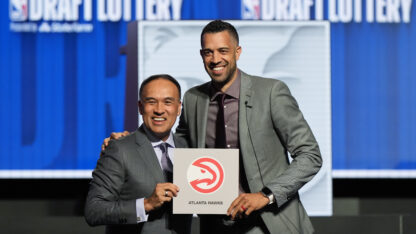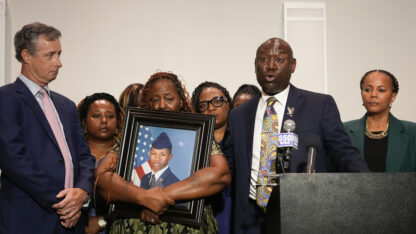Progressive Groups Make Early Choices In Georgia Governor’s Race

In the Democratic primary, former state House Minority Leader Stacey Abrams, left, and state Rep. Stacey Evans are vying to be Georgia’s next governor.
Georgia General Assembly photos
In Georgia’s Democratic primary for governor, it can be hard to find big policy differences between the two candidates: former state House Minority Leader Stacey Abrams and state Rep. Stacey Evans. But progressive advocacy groups aren’t waiting for a primary result. They’ve gotten involved in the race unusually early.
Last month, the national and regional political arms of Planned Parenthood endorsed Abrams.
“Stacey Abrams is the champion that Georgia women and families need,” said Staci Fox, who leads Planned Parenthood Southeast Advocates.
A few days later, Georgia Equality, an LGBT advocacy group, also endorsed Abrams.
“Stacey Abrams has not only supported our issues, she has actively supported openly LGBTQ candidates at the legislative level and has been instrumental in building the progressive infrastructure across issues,” Georgia Equality executive director Jeff Graham said.
But Planned Parenthood and Georgia Equality don’t have anything bad to say about Abrams’ opponent, Evans, and they don’t point to any specific votes or policy positions that led to their early choice.
In a news release, Georgia Equality pointed out it has “developed strong and meaningful relationships” with both candidates.
So, why do organizations pick one candidate over the other?
“They are betting on the candidate who they think is most ideologically aligned with them,” said Andra Gillespie, an associate professor of political science at Emory University.
Abrams has positioned herself as the progressive candidate, thus the endorsements, said Gillespie, but if elected, both candidates would probably back pro-choice and pro-LGBT issues.
“If Stacey Evans were to win the nomination,” Gillespie said, “I’m sure that these groups would provide support for her during the general election cycle.
Gillespie also pointed to Abrams’ time as minority leader in the Georgia Statehouse as an advantage that may have helped the candidate get the endorsements.
It gave her an opportunity to build relationships with progressive groups nationally and in the state, Gillespie said.
“Throughout her tenure in the Legislature,” said Abrams spokesperson, Priyanka Mantha, “Leader Abrams demonstrated her ability not only to vote on the right side of progressive issues but to leverage her leadership to successfully block attacks on civil rights and reproductive health care.”
Abrams has also drawn endorsements from a slew of pro-labor groups, as well as the Georgia Association of Educators.
The Georgia Federation of Teachers (GFT) has endorsed Evans.
“Stacey Evans was there at the crucial moments,” reads a posting on GFT’s website. “Stacey Evans has stood by the people of Georgia.”
The posting compares Abrams and Evans on a number of policies and votes, including some that are not directly related to education.
“We are proud of the depth of the statewide support from Georgia leaders we have received,” Evans spokesperson Seth Clark said. “Stacey Evans’ record on progressive priorities, including a woman’s right to choose and protecting voting rights, is second to no one else.”
The endorsements could give Abrams a fundraising boost and be a “shortcut” for some voters to make their decision about who to support, Gillespie said.
But voters should take endorsements with “a grain of salt,” said Melita Easters, executive director of Georgia WIN List, a political action committee that backs pro-choice, Democratic women. Early in the Democratic primary, the group decided not to back either candidate.
“Endorsements can give voters a shot of confidence when they are making a selection,” Easters said. “But certainly voters should always look beyond the endorsements and read more about the candidates before they make their final decision.”
Voting ends in the Georgia primary on May 22.








